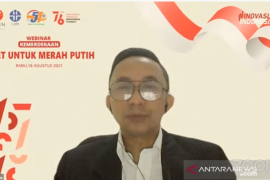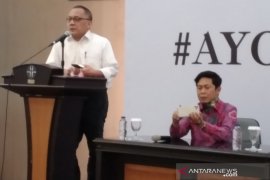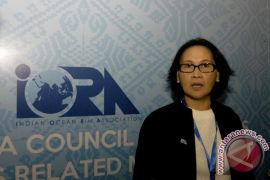The economic gap widened as growth has been recorded only in capital intensive sector not in labor intensive sector."Jakarta (ANTARA News) - An Indonesian scientist calls for adoption of inclusive economy to narrow the economic gap in the country.
"We hopes that the contestants in the forthcoming presidential election would adopt inclusive economy," Maxensius Tri Sambodo, a researcher from the Indonesian Institute of Sciences (LIPI) told reporters in a news conference here on Wednesday.
Maxensius said inclusive economy is one focusing on elimination of poverty.
He said inclusive economy is developed on three main pillars -- maximum use of economic opportunity, providing social safety networks and guaranteeing equal access to economic opportunity.
"The three pillars need to be seriously addressed in the futures economic development," he said.
He said support for inclusive economic system would result in the spread of growth to various sectors not only in certain sectors.
He noted that in the past several years the service sector has remained to be in the doldrums and the manufacturing and agricultural sectors grew moderately with only the mining sector recording a fairly strong growth.
"This is not good news. The economic gap widened as growth has been recorded only in capital intensive sector not in labor intensive sector," he said.
He also cited a number of factors that put a brake on the countrys economic growth including commodity price fall, tightening of the countrys national liquidity, trade deficit, Chinas economic slowdown, weak demand for Indonesian exports, falling value of rupiah against the US dollar and the general elections in 2014.
The LIPIs Economic Research Center urged the government to work harder to create basis for a more inclusive economic growth.
So far the countrys economic growth has been driven mainly by natural resources extraction and exploitations, he said.
"Such method is not far different from the system used in the colonial time. Allowing the system to go would hamper inclusive development. In the mean time the threat of middle income trap is looming," he said.
Middle Income Trap
Middle income trap keeps countries which have succeeded in breaking into the ranks of middle class countries from moving to the level of high income countries.
In order to get away from the trap a country needs to expand innovations such as South Korea.
Unfortunately, Indonesias economic growth is driven mainly by natural resource-based sector with little role of human resources and research and technology.
"Indonesia has not made much headway in the expansion of the capacity of human resources and research. It is sad that Indonesia is still lagging far behind South Korea and China," Maxensius said.
Earlier, Finance Minister Chatib Basri said strengthening human resources with innovation in technology could save the country from the middle income trap to grow to become a high income nation.
"We must attach greater importance on innovation and technology to create good comparative superiority," Chatib said on the sidelines of an international seminar on "Avoiding the Middle Income Trap" in Nusa Dua, Bali last week.
He said Indonesia which has gained a position in the ranks of middle income nations in early 1990s, would never be able to move to a higher level if it continues to rely on production of natural resource industry and cheap labor cost.
Therefore, the government has sought to improve productivity through innovation and application of high technology such as has been successfully carried out by South Korea, he said.
South Korea succeeded in breaking to the ranks of advanced nation in 15 years, he added.
In a bid to accelerate the process of industrialization based on high technology, the government would offer incentive for expansion of research and development, he said.
LIPI said the fast economic growth in the past several years contributed little to inclusive economic development as the growth has been driven mainly by capital intensive sector like the mining sector.
Development of capital intensive sector even hampered development of labor intensive sector such as agricultural sector, he said, adding, "not to mention the damage to the environment threatening long term sustainable development."
Number of farmers shrinking
LIPI noted with alarm the shrinking number and falling purchasing power of farmers keeping the agricultural sector in the doldrums.
Maxensius said the number of farm households dropped 5.1 million in the last decade.
It is normal that the number of farmers declines in a country in the process of industrialization , but the implication could negative to food security.
"The fact that most Indonesian farmers are people in the age group of 45 to 61 years also is not good for the countrys food security," he said.
In the next 10 years Indonesian farmers would be heavily dominated by old people, he predicted.
(Uu.H-ASG/S012)
Editor: Priyambodo RH
Copyright © ANTARA 2013










